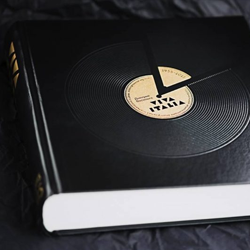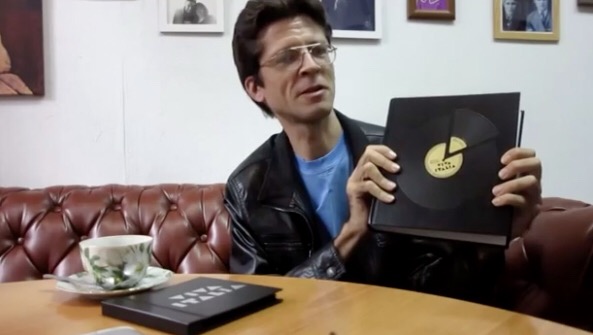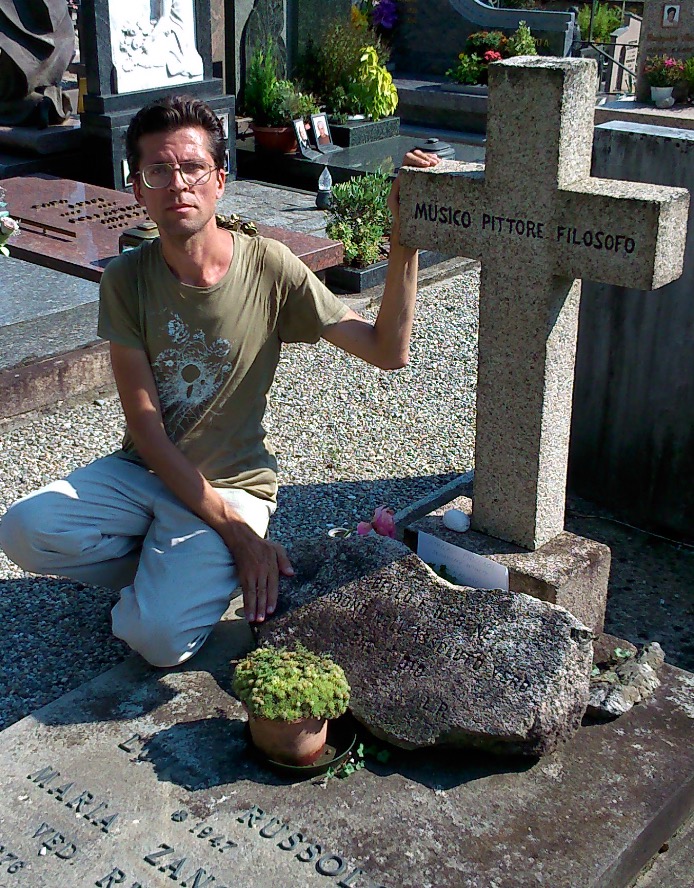Published by Alessandro Violante on December 10, 2017
 Dmitry Vasilyev, Russian journalist and label owner, has worked for a lot of time on a project called Viva Italia!, a huge book written in Russian but dedicated to Italian experimental and industrial music, plus a four cd box set full of songs written by the most interesting Italian musicians. After having come back home after his long tour across Italy presenting his book in a lot of cities, we asked him an interview on our pages, and that’s the result.
Dmitry Vasilyev, Russian journalist and label owner, has worked for a lot of time on a project called Viva Italia!, a huge book written in Russian but dedicated to Italian experimental and industrial music, plus a four cd box set full of songs written by the most interesting Italian musicians. After having come back home after his long tour across Italy presenting his book in a lot of cities, we asked him an interview on our pages, and that’s the result.
Hi Dmitry! Some months ago I discovered that in Moscow there was someone who wrote a huge volume about Italian industrial and experimental music, and some months later I’ve met him, it’s been an honour, I thank you for the albums, they’re very interesting. Let’s start the interview explaining to the readers what Vita Italia! is.
Hi Alessandro!
Well, Viva Italia is the big project started by me around 12 years ago. At that time, I got more and more fascinated with italian experimental music scene, discovering many great names like Maurizio Bianchi, Sigillum S, Atrax Morgue, Bad Sector, Nightmare Lodge, Gerstein, F:A.R., Tasaday, T.A.C. etc. I was doing the printed magazine in late 90s and once I decided to make the next issue devoted only to italian music. While working on that, I realised that the format of the magazine is not enough. There was so much interesting and important material that I came up with the idea of a book. The name was chosen by the pure intuition, really before than I realized that it may sound like political slogan, but I don’t care.
Viva Italia book presents the historical overview of experimental music, it’s the compilation of numerous articles about the artists and labels appeared in Italy during the recent 60 years. It represents my personal view to their work and impact to the world of art, and it’s apparently the first ever attempt in Russia of approach systemically to the knowledge about the cultural phenomena of experimental, industrial, noise, electroacoustic, avantgarde and other unusual music coming from Italy. Here you can find the information about more than 800 musicians, their photos and detailed descriptions of their albums.
All the articles are grouped into five chapters: early electronic music (1955-1980), academic music, new wave and industrial scene (1980-1984), music from pre-digital stage (1985-1995) and all the contemporary scene (1996-2015). The last two chapters consists of independent labels review and the interviews with musicians, most of those were intended to be included in aforementioned IEM magazine which was never published again after year 2003.
You’re a journalist, you also run a label, Monochrome Vision, which has released a lot of albums. Do you want to talk me about it?
Yes, some time later, in 2004, I founded a label which became my main activity for the next 10 years. So far, I released over 50 CDs with experimental music from USA, Japan, many european countries, and of course from Russia. In the meantime, I converted the magazine to weekly podcast, which I thought would serve the same purpose of presenting artists, musicians, labels, but in more efficient way than the magazine. The only problem was that the podcasts, just like the magazine were quite time consuming. That’s why my work on the book slowed down and took so many years to complete. I was involved also to concert promotion and organized a number of concerts and festivals for experimental music in Russia and Ukraine, for those he is inviting some outstanding artists from many european countries since the year 2002 up to this moment, mainly as self-supporting outlet. Monochrome Vision was expanded to one of the most active music distribution networks in Russia and working directly with dedicated and innovative labels from all over the world.
How have you discovered the Italian sound? What’s been the first input? How have our sound reached Russia?
Even at the first glance, you might have the impression that Italy has the most immense and active scene in the world. Probably it’s not, but there is no doubt that Italy has great impact to the western culture and the whole history of art in general. Since the ancient times, Italians created a lot for the development of art – not only music, but also visuals, literature, architecture, whatever. The renaissance epoque, gothic, baroque, mannerism, futurism – every kind of art direction evolved and preserved in numerous museums. And speaking about the music, which occupied a special place, it was just great in any form, from classical opera to contemporary avantgarde. It was supported by state infrastructure which has everything like conservatories, opera theaters, radiostations and television studies, musical festivals and the centers of musical research. So, the musical life in Italy is very active and has a sensational succession – even in the most radical and extreme creations you can still hear a special harmony. I think it’s absolutely unique feature, I am fascinated about it for all the time.
How much time did you spend organizing the music for the four cd compilation? Have you done all by yourself or with the help of someone else? It seems to me that all the songs there contained are unreleased songs, is it correct?
I have to say that many artists were already featured in my podcasts throughout the years, where I combined the information with their music. To keep the same spirit, I decided to produce the 4 CD box for the book, so you have a possibility to listen the music of many authors mentioned in the book, more than 5 hours of music.
In fact, most part of compilation material I got during the first couple of years of my work on the project, i.e. many years ago. I wanted only exclusive, previously unreleased tracks, so when the time of publishing has come, I excluded these ones that were already released somewhere. On the other hand, new stuff was arriving from the musicians I’ve got in touch recently. The huge help in this way was given by my dear friends Diego Loporcaro and Vincenzo Gattagrisi (the latter one unfortunately passed away last year and haven’t seen the result of our work).
You’ve visited a lot of Italian cities, you’ve done this huge tour, and you’ve known a lot of people, artists and not only, among them the Italian industrial music legend Maurizio Bianchi. What has this holiday given you? Have you understood something more about our music panorama?
Of course this tour would be impossible without the kindest help of my Italian friends, likeminded people and fellow musicians/label owners who arranged for me the possibility to stay and organized the presentations in various cities. To mention just a few, I should say many thanks to Carmine Pizutti, Maurizio Pustiznaz, Massimo Carozzi, Christian Adamo, Raffaele Cerroni, Mimmo Napoletano, Gianfranco Santoro, Enrico Coniglio and many others!
The book is in Russian only, because my idea was also to connect somehow the Russian and Italian audience, to promote italian music in Russia. So the idea of presentations was not so much to sell the book, but rather to show up and tell about my background, the situation in Russia now and then, to set up new contacts etc. Recently, it became even political in some sense, because you see now is the time of the new cold war beginning, and we have to react on that somehow, so I think that it’s interesting to know for people in Italy, that someone on the other end of globe did such a big job researching their own culture. While economy, politics and social relations can divide people, music and art in general is something which can connect them!
Let’s talk about avantgarde artistic references, for example that of Futurism. During the early XIX century, in Russia there was also Constructivism, and these two movements were linked in some way. What do you think about Constructivism and about Futurism?
Well, I didn’t included the information about futurists in my book, because their work was not so much about electronic music, but more about the new aesthetics. Of course it was and still is very influental, and I even paid the homage to Luigi Russolo visiting his grave in Laveno, but these early avantgarde art movements are not a part of my research in general. Anyway, I like them very much and would be interested to know more about the links between them.
Do you think that music and geographical areas, society and culture are linked? In Italy, for example, there’s a lot of interest for power electronics and other genres, less towards others. Is there a specific reason for this, according to you?
Of course, there is interesting structure of links and relations between national cultures, music genres and geographical areas. I think it’s mainly can be explained by the distribution of traditions through the distances. We can also speak about schools, I mean the following and learning from one generation to next one. And the national character also makes sense. Maybe some more reasons, who knows…
What do you think about foreigners music scenes? What the Italian music scene has more than the others?
For me, italian music is more emotional and honest than music from other countries. Maybe it’s less cerebral, less formal, and more passionate. The same I can say about the music from Russia (well, those best examples I know and can think of). Also, what we have in common – the total absence of any state support for underground culture! Which is a little pity, I’d say…
It seems to me that we have a rather strong linkage with so called Contemporary classical and Avantgarde music, let’s think about Russolo, to name an example. It seems to me he’s still a sort of influence for current musicians. Do you agree with it?
Of course I agree, as I said before, it’s all about the spiritual and educational connection between generations. The highbrow official art may reject that, but without any forms of experimentation the art is dead. Russolo is huge figure in art history, but seems that he is still not the celebrity – the vast majority of people are even not aware about him, his house and grave are not touristic places at all! By the way, I am one of the jury members for the Prix Russolo international music contest, which was founded in 70s by Pierre Schaeffer but still exists as the self-supporting initiative.
Are you working on other new projects too? If so, can you talk us about them?
As I said, Viva Italia is the big project, and the book is just the first step. Next step for me now is the promotion of the book in Russia, for this reason I am going to organize the series of the festivals and invite the italian musicians to perform in Russia. That’s what I am doing right now, and I hope I will succeed!



